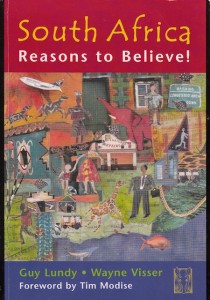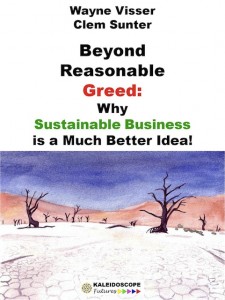Top 10 Reasons to Believe
Chapter by Wayne Visser
Extract from the book South Africa: Reasons to Believe
1 SA is a nation of survivors
We’ve transformed countless times and faced untold hardships with great courage and remarkable endurance. We’ve got tried-and-tested skills to vasbyt, to adapt, to survive, to thrive.
2 SA is proof that miracles do happen
Between 1994 and 2001, people with houses increased from 64% to 77%, people with electricity went up from 58% to 80% and those with piped water rose from 68% to 76%.
3 SA is rapidly redefining its image
From morrisjones&co’s Homecoming Revolution ad campaign to expats, to Proudly South African’s logo for quality local products, to the IMC’s Brand South Africa initiative, ‘Alive with Possibility’.
4 SA is poised for an economic take-off
We’re currently the 7th best performing economy in the world with the 3rd highest export growth rate (higher than the export explosion Japan experienced in the 50’s and 60’s!).
5 SA inspires world-class business
SAB (now SABMiller) is the world’s 2nd largest brewer, while the inspirational Mark Shuttleworth captured 40% of the Internet digital certification market before selling Thawte Verification for $575 million.
6 SA is blessed with natural and cultural assets
We have four World Heritage Sites: The Cradle of Humankind, Robben Island, St Lucia Wetland and the Drakensberg. And the new 35 000 km2 Great Limpopo Transfrontier Park is larger than many European countries.
7 SA’s diversity is a fountain of creativity
Miriam Makeba was the 1st African Grammy winner in 1967. Nadine Gordimer and J.M Coetzee have both won the Nobel Prize for Literature. Athol Fugard is the second most performed playwright in English, after Shakespeare.
8 SA has produced icons of history
We have four Nobel Peace Prize winners — Albert Luthuli (1960), Desmond Tutu (1984), and Nelson Mandela and FW de Klerk (1993). Gandhi first tested his passive resistance technique in SA and Jan Smuts wrote the preamble of the UN Charter.
9 SA can show the world a new better way
No country is better positioned to prove to the international onlookers that different cultures can co-mingle and produce a remarkable civilisation.
10 South Africans can make a real difference
Challenges bring opportunities to really do something meaningful. As SA rabbi, Warren Goldstein, puts it: ‘Our lives are full of significance here. It may not always be “pleasantville”, but it’s always “meaningful”.
Related pages
[button size=”small” color=”blue” style=”info” new_window=”false” link=”http://www.waynevisser.com/books/south-africa”]Page[/button] South Africa: Reasons to Believe (book)
Cite this chapter
Visser, W. (2003) Top 10 Reasons to Believe, In G. Lundy & W. Visser, South Africa: Reasons to Believe! Cape Town: Aardvark, 1-14.
Love this page
Click on the pink heart in the heading if you LOVE this page









